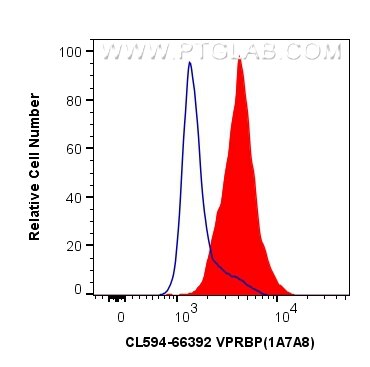Anticorps Monoclonal anti-VPRBP
VPRBP Monoclonal Antibody for FC (Intra)
Hôte / Isotype
Mouse / IgG2a
Réactivité testée
Humain
Applications
FC (Intra)
Conjugaison
CoraLite®594 Fluorescent Dye
CloneNo.
1A7A8
N° de cat : CL594-66392
Synonymes
Galerie de données de validation
Applications testées
| Résultats positifs en cytométrie | cellules K-562 |
Dilution recommandée
| Application | Dilution |
|---|---|
| Flow Cytometry (FC) | FC : 0.80 ug per 10^6 cells in a 100 µl suspension |
| It is recommended that this reagent should be titrated in each testing system to obtain optimal results. | |
| Sample-dependent, check data in validation data gallery | |
Informations sur le produit
CL594-66392 cible VPRBP dans les applications de FC (Intra) et montre une réactivité avec des échantillons Humain
| Réactivité | Humain |
| Hôte / Isotype | Mouse / IgG2a |
| Clonalité | Monoclonal |
| Type | Anticorps |
| Immunogène | VPRBP Protéine recombinante Ag2184 |
| Nom complet | Vpr (HIV-1) binding protein |
| Masse moléculaire calculée | 1506 aa, 169 kDa |
| Poids moléculaire observé | 169 kDa |
| Numéro d’acquisition GenBank | BC022792 |
| Symbole du gène | VPRBP |
| Identification du gène (NCBI) | 9730 |
| Conjugaison | CoraLite®594 Fluorescent Dye |
| Excitation/Emission maxima wavelengths | 588 nm / 604 nm |
| Forme | Liquide |
| Méthode de purification | Purification par protéine A |
| Tampon de stockage | PBS avec glycérol à 50 %, Proclin300 à 0,05 % et BSA à 0,5 %, pH 7,3. |
| Conditions de stockage | Stocker à -20 °C. Éviter toute exposition à la lumière. Stable pendant un an après l'expédition. L'aliquotage n'est pas nécessaire pour le stockage à -20oC Les 20ul contiennent 0,1% de BSA. |
Informations générales
VprBP was first identified as a protein that can interact with HIV-1 viral protein R (PMID: 11223251). It is a component of the CUL4A-RBX1-DDB1-VprBP/DCAF1 E3 ubiquitin-protein ligase complex that could interact with HIV-1 virus Vpr protein and HIV-2 virus Vpx protein (PMID: 18332868; 17314515; 18606781). VprBP is a 1,507-amino acid protein that contains conserved domains, including YXXY repeats, the Lis homology motif, and WD40 repeats. Through binding to Vpr, VprBP allows Vpr to modulate the catalytic activity of the CUL4-DDB1 complex, which in turn leads to the induction of G2 phase arrest in the virus-infected cells (PMID: 17630831). Recently it has been reported that VprBP is able to regulate the p53-induced transcription and apoptotic pathway (PMID: 22184063).
Protocole
| Product Specific Protocols | |
|---|---|
| FC protocol for CL594 VPRBP antibody CL594-66392 | Download protocol |
| Standard Protocols | |
|---|---|
| Click here to view our Standard Protocols |


